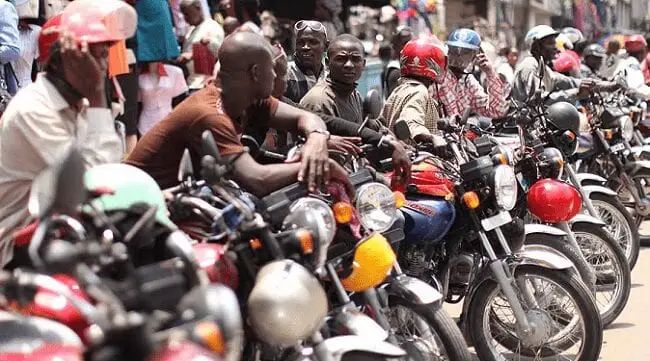In the busy streets of Ghana specifically Accra and Kumasi, change is happening for motorcycle transport operators popularly known as okada riders.
The government has introduced new rules aimed at protecting both riders and passengers as well as road-users in a bid legitimize the business and hand it some structure.
The new rules stipulate that citizens who intend to venture into the business must at least 25 years old. This age limit is to make sure that riders are mature and responsible enough to handle the risks that come with riding on Ghana’s busy roads. Every rider also needs to have a valid national identity card for proper records keeping, crime reduction and misconduct.
A big part of the new rules is that riders must get a commercial rider’s license from the Driver and Vehicle Licensing Authority (DVLA). But getting the license isn’t as simple as just applying for it you have to pass a special test first. This test includes three parts: an oral test, a written (theory) test, and an eye exam. These tests are there to make sure that every rider is familiar with the road signs, understands traffic laws, and can see clearly while riding.
After passing the test, each rider must go through proper training at an approved center. This training helps them learn how to ride safely, deal with emergencies, follow road rules, and treat passengers with respect. When a rider completes both the training and the tests, they are given a bright yellow number plate. This yellow plate is special it shows that the rider is fully registered and has passed all the requirements. It also helps passengers, and the police know which riders are operating legally.
These new rules form part of a bigger plan by the Ministry of Transport and the DVLA to reduce accidents and make motorcycle transport safer. Over the years, the business has helped thousands of Ghanaians earn a living and fend for themselves and their loved one.
As more riders get their yellow plates, the streets of Ghana may begin to feel a little safer and more organized. Passengers will feel more confident in using this mode of transportation, and riders will benefit from being recognized as trained professionals. This is not just about changing rules it’s about building a better system that works for everyone on the road.
The government has introduced new rules aimed at protecting both riders and passengers as well as road-users in a bid legitimize the business and hand it some structure.
The new rules stipulate that citizens who intend to venture into the business must at least 25 years old. This age limit is to make sure that riders are mature and responsible enough to handle the risks that come with riding on Ghana’s busy roads. Every rider also needs to have a valid national identity card for proper records keeping, crime reduction and misconduct.
A big part of the new rules is that riders must get a commercial rider’s license from the Driver and Vehicle Licensing Authority (DVLA). But getting the license isn’t as simple as just applying for it you have to pass a special test first. This test includes three parts: an oral test, a written (theory) test, and an eye exam. These tests are there to make sure that every rider is familiar with the road signs, understands traffic laws, and can see clearly while riding.
After passing the test, each rider must go through proper training at an approved center. This training helps them learn how to ride safely, deal with emergencies, follow road rules, and treat passengers with respect. When a rider completes both the training and the tests, they are given a bright yellow number plate. This yellow plate is special it shows that the rider is fully registered and has passed all the requirements. It also helps passengers, and the police know which riders are operating legally.
These new rules form part of a bigger plan by the Ministry of Transport and the DVLA to reduce accidents and make motorcycle transport safer. Over the years, the business has helped thousands of Ghanaians earn a living and fend for themselves and their loved one.
As more riders get their yellow plates, the streets of Ghana may begin to feel a little safer and more organized. Passengers will feel more confident in using this mode of transportation, and riders will benefit from being recognized as trained professionals. This is not just about changing rules it’s about building a better system that works for everyone on the road.




